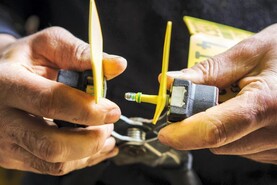This year has been a lesson on how intricate the relationship between our animals and their environment really is and all the ways in which it can be thrown out of kilter. Here in Clonmel, we had a front row seat of all 2018 had to offer.
We typically see calf scours begin in mid- to late March and reach their peak in mid-April. However, this year our scour season started with a bang on 3 March, as the snow of Storm Emma poured into our calf sheds.
We always talk about the balance between the animal, the bugs and the environment, like three legs of a stool. Usually, the increasing stocking rates and warmer temperatures lead to too many bugs for the calves to handle. In this case, a clean not yet half-stocked shed had way too many bugs.
It was amazing to see how 48 hours of severe cold stress could completely decimate a calf’s immune system. It reminded us that a calf’s need for warmth is closer to our own than that of a cow.
Two months later, we were in a drought that was more severe here than for most of the country. The cattle gathered around feeders in the dusty, dead pastures eating increasingly exotic feeds that promised to provide some of the fibre and protein of grass.
The majority of the cows adapted well, but increasingly we were called out to cows down, suffering from severe acidosis.
The lack of long fibre and the excess of starch completely changed the type of bacteria in their rumens. We were able to save very few of these cows.
In September, the ever-resourceful farmers planted rape and Redstart. The bumper crop has caused a few problems of its own though, with some cattle suffering from acidosis due to the high sugars and more developing bloating – potentially fatal problems if not managed properly.
It is important not to introduce hungry cattle suddenly on to these crops without a source of fibre and good mineral supplementation, particularly iodine and copper.
Kevin Meaney holds a certificate in dairy herd health and works with Southview Veterinary Hospital in Clonmel. Southview Veterinary Hospital is part of XLVets. XLVets is a group of progressive practices who are working together to achieve a better future for agriculture and veterinary in Ireland. For further information, go to www.xlvets.ie.






 This is a subscriber-only article
This is a subscriber-only article









SHARING OPTIONS: